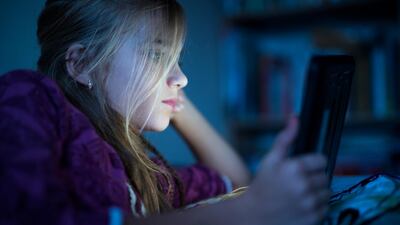Related: UAE study finds heavy smartphone use leaves us sleepless and exhausted
A fixation with social media could hamper literacy levels among pupils who are increasingly glued to their phones rather than burying their noses in books.
Teachers have warned that the dominant role of technology in young lives is proving a distraction.
Dubai's education regulator, the Knowledge and Human Development Authority, found only 14 per cent of schools were "effectively developing reading across the curriculum" in its 2019 Dubai School Inspection Report.
But teachers said they faced a tough challenge as reading was typically "not part of the life" of children away from the classroom.
Michael Bloy, secondary headteacher at Kings' School Al Barsha said youngsters find it difficult to unplug themselves from online platforms.
"Now, children are online 24/7 and they don’t switch off. The social pressure to be engaged is changing patterns of behaviour," said Mr Bloy.
"Children may be reading in school, but it’s not necessarily part of their life.
"When we would go home as children we would pick up a book because that was the way to entertain ourselves, but technology has changed that.
"Teenagers are constantly looking for reassurance and these things distract from traditional pastimes."
A 15-year-old pupil at the school carried out an experiment where she removed herself from all her social media accounts including Instagram, Twitter, and Snapchat.
“The results were phenomenal. She gained three hours every day and she was reading more and taking books out of the library," said Mr Bloy.
The teacher believes schools need to give children a reason to read and research, rather than feeding them prepared material.
"In order to raise standards, you need to get them to want to read.
"We have to give them a reason to read more. For exams, teachers give the answers and tell them what they need to know, so they don’t need to research."
Reading is important for children as it promotes brain development and imagination, increases their knowledge, expands their library, improves their memory and develops their analytical thinking abilities.
A major 2018 study carried out by University College London (UCL), based on data from 11,000 children born in the year 2000, found time spent on social media could have a negative impact on reading and writing skills.
The research suggested a tendency to use shortened words such as 'nite', 'u' and @ while conversing online could effect literacy levels.
The most recent Progress in International Reading Literacy Study, which assesses the reading skills of fourth graders across the world every five years, found the UAE lagging behind much of the world.
The 2017 study found the UAE ranked 40 out of 50 cities and countries on the international league table.
Sonia Kohli, assistant headmistress at Indian High School in Dubai, said time constraints offer a hurdle for schools to overcome.
"The number of working days is limited and we have to make sure that other areas are given equal importance," said Ms Kohli.
"Children prefer technology over books and phones and social media are some of the reason pupils are less interested in holding a book and reading."
The teacher believes children should be given greater access to books online as they spend a lot of time using technology.
“When it comes to a thick book, pupils get scared and it is intimidating for them," she said.
She said pupils are more comfortable completing assignments online, so they may read more if given an option of consuming content digitally.
Indian High School, the largest private school in the country, is stepping efforts to encourage reading through a series of initiatives, one of which involves the entire school spending time reading together.
Michelle Forbes, principal of Gems Al Barsha National School for Girls, said giving children culturally appropriate books they can relate to is crucial.
"When I came to the UAE eight years ago, the quality of reading material that was available was in many cases anglo-centric and sometimes not meaningful to some of the students. The content wasn't always age-appropriate," said Ms Forbes.
She said publishers have listened to schools' feedback and are improving the quality of the texts.
The school participates in poetry days and literature festivals in a bid to get children to pick up books.
Ms Forbes believes it is essential for children to have meaningful role models who encourage them to read.
The school invites English and Arabic authors to speak with the children. Dana Alblooshi, the teenage author of the book 13 Amazing Women of Arabia recently shared her love of literature during a talk at the school.



